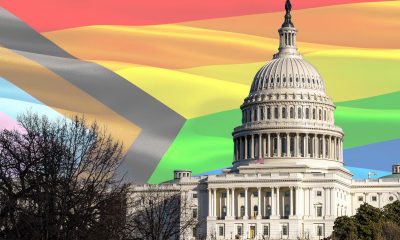National
Amy Siskind is keeping a list of Trump’s anti-LGBTQ moves
Tracking Trump’s lies goes viral
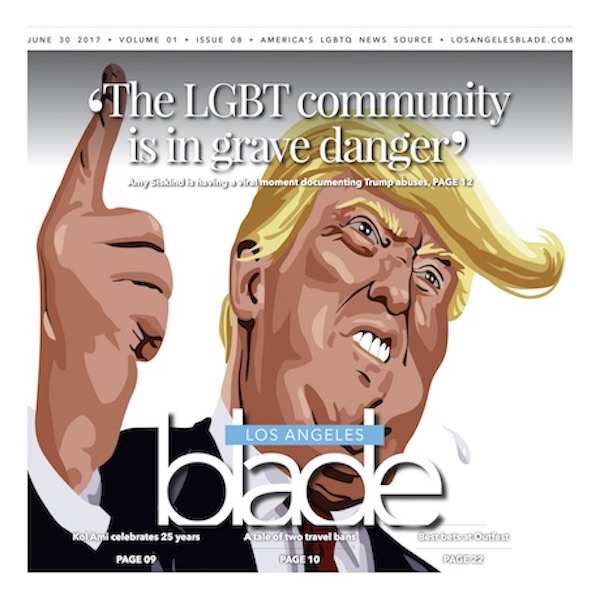

The cover of the June 30 issue of The Los Angeles Blade.
Amy Siskind’s work is the kind of genius historians will refer to in the next decade as the definitive chronicler of what went wrong and how.
“Experts in authoritarianism advise to keep a list of things subtly changing around you, so you’ll remember,” she likes to say.
Each day brings a bombshell that in ordinary times would dominate the news cycle for months with sweeping investigations. Trump takes to Twitter over the slightest perceived slight, promoting the fakest narrative he can spell out in 140 characters about news he wants his followers to ignore.
But that, like so much else, is just a charade that masks a whole spate of other alleged crimes and misdemeanors now under multiple investigations. While we are hyperventilating about a Tweet, something else much darker is happening.
And that’s where Siskind comes in. For the past seven months she has taken note and documented every instance of the abnormal or bizarre, spending 15-20 hours a week and talking to thousands of people to synthesize events as they happen.
She publishes her work (dubbed the “Weekly List”) chronicling the bad deeds of the Trump administration on social media platforms, including Twitter, Facebook and Medium, attracting hundreds of thousands of weekly readers. Her work has been highlighted by The Washington Post and The Independent and Siskind is considered a rising star. A NYU journalism professor called her work “thoroughly journalistic and much needed.”
Siskind said her work on Trump originated from her post-election reading about how authoritarian governments take hold — behavior that seems shocking at first quickly becomes normal.
And on LGBT rights, she has a particularly urgent message, especially if you continue to believe that Trump hasn’t really gone after the LGBTQ community.
The Blade spoke with Siskind by phone from her home in Westchester County, N.Y.
BLADE: What’s the motivating force behind your work tracking Trump’s lies and the administration’s bizarre behavior? You told The Washington Post that it developed when you read about the process of normalization, that we come to accept things that are abnormal because we get lost in this slow drift of bizarreness. So I guess my question is, what strikes you so far as the most bizarre thing that’s happened?
AMY SISKIND: Though there are too many to mention, I think what strikes me most is that we are living in a constant state of chaos. There are so many items each and every day that are, in and of themselves, shocking. In normal times these things would be individual stories that would be covered by our media for weeks or months. But, because there are so many of them, we’ve lost track of accountability for these items or being able to even remember them. As a result, we’ve in a way normalized things that in any other time in our country or in our lifetimes would be shocking and deserving of outrage around the country. We’re bombarded with so many of these each and every day we’ve become desensitized.
That’s led to a sort of acceptance because we are sort of plowed over by all that’s not normal.
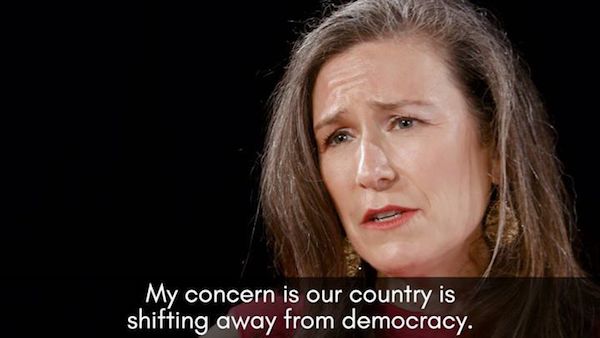
Amy Siskind is a former Wall Street executive who co-founded The New Agenda, a national women’s organization devoted to improving the lives of women and girls. She is also a recognized LGBTQ activist.
BLADE: Even journalists are plowed over. There’s tacit endorsement when they do not properly challenge him.
SISKIND: The bar was set pretty low by our media. I have myself been a critic of the media early on about some journalists complimenting him for reading off a teleprompter or covering him like you would a normal candidate, talking about things like infrastructure when it was pretty obvious even before he took office that he was not going to be normal.
Even though it started out that way, I am grateful to see a shift.
I think the media has realized they are under siege now and being silenced. I see mainstream journalists beginning to form a community and protecting one another. Journalists from the right are still amplifying authoritarian messages and giving credence to “news” that’s not true news. I am starting to see change.
What The List does that our media is not able to do — because they need to cover every story as if it were a traditional administration (or in Trump’s case it’s a regime) — is give some perspective week by week about what’s happening.
What mainstream journalists are reporting is very in the moment but it doesn’t, with the exception of a few like maybe Rachel Maddow, trace back the story.
For example, The List can follow the Deutsche Bank story over weeks or months whereas most of the reporting is just “here we are in this moment and today.” So what I really hope to accomplish with The List is to access all the stories about Deutsche Bank that have happened over the last several months since I’ve been doing The List. It’s a journalistic way of tying things together that our media is not doing.
Typically, I spend 15 to 20 hours a week on each list because so many of the things I put in it are not widely seen, but to me are really important.
I spend a lot of time covering treatment of different subsets of people because that’s part of authoritarianism; I mean how you treat one then how do you treat the LGBTQ community how you treat people of different religions and people of color so I make sure to highlight things that are really not normal.
I cover the way citizens are acting but also the way the administration is acting.
BLADE: What do you make of gay Republicans and Trump supporters who say he hasn’t really done anything specifically bad to LGBTQ people?
SISKIND: That’s an uninformed argument. I think the LGBT community is in grave danger with Trump and the overriding thing is that we are invisible to the Trump administration.
And I’ll give specific examples of ways that he is hurting our community, but the overall theme is we’re invisible that’s never good for any community.
Let’s start with the fact that there’s no recognition of LGBTQ Pride month. When we are made invisible you take away our identity. Trump is doing that by not recognizing Pride: he’s doing that by not including LGBTQ people in the Census.
That’s a really big deal and I have it in my weekly list 32 that just came out; NPR did a Freedom of Information Act request on work that was done by HUD and they said Census data was essential for the inclusion of the LGBT community to be part of the Census. Trump’s response is that they don’t think it’s appropriate to ask questions of sexual orientation and gender identity topics, which is an argument that makes us invisible.
BLADE: That Census information is used throughout government to implement civil rights protections and to ensure representation and equality.
SISKIND: Point is that if you’re invisible you don’t need protections or rights. So, you can see the path down which he is taking the nation.
Also in Week 32, his Secretary of Education DeVos said she won’t go after schools that discriminate against transgender students amongst other things. They are not going to push on the civil rights issues. That was just one week!
Not protecting transgender people is an issue. They’ve also already taken away – in certain government departments – worker protections on the basis of sexual orientation.
So when you make people invisible, you don’t need to protect them against discrimination in housing and workplace discrimination. So, in many parts of the Trump administration it’s legally acceptable to discriminate against people based on their sexual orientation or gender identity.
And that’s that headline worthy!!! That should scream out with three exclamation points at the end.
People who don’t think he hasn’t done anything against LGBT people are missing the point — he’s slowly eroding our protections and making it legal to discriminate against us because of our sexual orientation and gender identity.
BLADE: It’s very much like what you said about authoritarianism — a slow erosion of normalcy.
SISKIND: Exactly! And end of rights for different subsets of people. You can see the different subsets of people that are under attack. It’s pretty much everyone that’s not white, straight, Christian and male. We can have the same conversation about ways women are being attacked or Muslim Americans or Jewish Americans or Latinos or immigrants or Black Americans or something for everybody.
BLADE: Those, of course, include LGBT people…
SISKIND: Yes, we are under assault in so many ways. Let’s talk about Gorsuch. Just this week his Supreme Court appointee argued against gay adoption. And the scariest part of that to me is that it’s not based on fact. There’s study after study showing gay and lesbian parents are actually superior parents to heterosexual parents! So, it’s not based on any factual study, it’s based on his own bias.
These are the people that Trump is bringing into power and into authority. If that doesn’t scare you! There’s now, I think eight states, since he took power that are making it illegal for gay couples to adopt.
I know California now has banned official government business travel to those eight states.
But there’s eight states — since he took power — that are making it illegal in their state for gay people to adopt. Between workplace discrimination, gay adoption, and what happened to transgender people, transgender students being excluded from protection under the Civil Rights Act and in college too. I mean, this is something that impacts the LGBTQ community.
BLADE: They have taken away the right to sue for those things.
SISKIND: Yes! They won’t pursue that under DeVos and our Department of Justice. And we’re just at the start of things!
I’m looking here at week 20. ‘Trump signed an executive order which legalizes discrimination against LGBT federal employees.’ Yes, that’s one of the two items that week. And then the Census.
But that’s really a huge thing I mean it and then in a later week you have (Commerce Secretary) Wilbur Ross removing sexual orientation and gender identification from its anti-discrimination policies. That another really big item to include in week 30.
BLADE: So much for the idea that Trump has done nothing to hurt LGBT people.
SISKIND: Yes, we are under assault and I think the community’s in great danger; he’s not going to stand up on stage and say “I am a bigot.” He’s going to slowly erode our rights and make us invisible. That’s what he is doing.
BLADE: What happens if Pence replaces Trump?
SISKIND: What’s going to happen, in either scenario, is that we’re going to be in chaos. I mean Trump isn’t getting anything done legislatively. And if he faces impeachment hearings or if he faces other criminal proceedings, nothing’s going to get done legislatively. But he still can slowly erode things.
Will Pence be any better or worse? We don’t know. We don’t know if Pence himself will be ensnared by what’s going on — I find it hard to believe he won’t be.
Regardless, I think it has to be a goal for everybody, every American. Any normal Republican is a better alternative than losing our democracy, which is what’s happening.
The basic rights that were afforded, including our voting rights and fair elections are, under Trump, under siege.
When people ask me that question you don’t know exactly how anything’s going to play out; you know it’s going to be chaos. Would I rather have Pence?
I’ll deal with that option when it comes to it, but I can tell you right now we’re in danger and I don’t think there’s anything that could be any worse than what we’re currently living in.
BLADE: With the Supreme Court decision to take on the wedding cake case on the same day it basically erased the line between church and state, it’s really hard to imagine we aren’t about to face a significant setback. It looks like the threat to LGBTQ people is spreading throughout government.
SISKIND: Well, if he’s able to appoint another Supreme Court judge — we just have to pray for our Ruth Bader Ginsburg that she can stay on the bench until the 2020 election.
I worry about all of it. But I think we get sort of distracted if we just focus on what’s happening in the judicial branch because Trump is doing so much damage in the executive branch already, that people are just kind of numb to…that, I think, is the biggest purpose with what I’m doing with The List and the conversation you and I are having.
We need to raise awareness that already we are becoming invisible and that our rights are being eroded.
It’s hard to imagine exactly what will happen with the Supreme Court cases. You know, we’ve lost Scalia and gained somebody who’s maybe even further right than him.
I think probably the only issue that is NOT currently on the table is gay marriage, and that’s only because generations are so decidedly pro-gay marriage.
Everything else, though — you can be married and have every other right taken away from you, including the ability to have people make your wedding cake, host your wedding, or be discriminated against and beat up on the way back from your wedding.
I think our community has become so obsessed about the success of this one issue that we’ve forgotten about all the other issues that impact our daily living.
BLADE: This slipperiness is all playing out in the background of the Russia investigation. This is what is happening while we are all hyperventilating about Russia.
SISKIND: And that’s why every week in The List you can find all the events that are playing out.
If you put in LGBTQ it will show you all the items that have already changed. If you put in Muslim, you’ll see all the assaults on Muslim people. If you put in Black or African American, you’ll see the items about the nooses in D.C. or the gorilla mask in Tennessee this week. I’m really trying to keep a focus on every week’s list of what’s happening.
The fabric of our country is changing. We are legitimizing hate and it’s hate against everybody that’s not white, straight, Christian and male and I think there needs to be a much greater awareness within our community of the danger we’re in, what you normalize, what happened to that 17-year-old Muslim girl walking back to her mosque after having a meal at McDonald’s before starting Ramadan.
That could have been a trans student or a gay man or a woman walking down the street. It can be any of us that aren’t the same.
BLADE: Just as Trump eliminated Pride at the White House, he also eliminated Muslim celebrations.
SISKIND: He didn’t celebrate Cinco de Mayo either.
BLADE: He’s an equal opportunity eraser.
SISKIND: For anybody who’s not white, straight and male. But anybody in our community who is complacent is missing the boat, because you still have to be able to walk down the street each day, you have to be able to get a job, you have to be able to get housing and right now he’s making it legal to discriminate on all those things.
We can’t underestimate the danger that we are in as a community. Gay marriage is just a little piece of icing on the cake but we have to raise our children, we have to be able to work and live and be safe and all those things are under siege.
BLADE: Marriage is not safe. It they can create a system of laws that make it legal to deny you services, we are not equal.
SISKIND: Right, so it’s sort of like a tin victory! You can get married but we won’t make you your cake, we won’t host your reception.
BLADE: We won’t protect your right to your own children.
SISKIND: Right. Our community gets too hyper focused on marriage and has dropped the ball on everything else. People feel like “oh, we crossed that bridge and now it’s done,” kind of like women with abortion rights. It was 1973 and here we are in 2017 and talking about taking away Planned Parenthood.
Nothing is guaranteed. One victory on a single issue doesn’t mean everything else isn’t in danger of being rolled back. We have to remember also how far as a community we came and how quickly. I mean, this is been endemic in the women’s movement; big victories and then everyone’s like “Oh, good now everything’s done and we’re equal.”
No. It happens in every community. We have this huge victory and we like stopped agitating and stopped organizing and stopped worrying. And that’s a false hope.
We are in danger under this regime.
BLADE: How did you feel about the Resist marches across the country?
SISKIND: I marched in New York. As much as you can do in person…it’s sort of like fuel and it reinvigorates you. Our organization does a big event each year called National Girlfriends’ Networking day and so many of the young woman said to me ‘I needed this because I feel so disempowered.’
I think whatever you can do in person really is helpful.
National
LGBTQ+ asylum seeker ‘forcibly removed’ from US, sent to El Salvador
Immigrant Defenders Law Center represents Venezuelan national

An immigrant rights group that represents an LGBTQ+ asylum seeker from Venezuela says the Trump-Vance administration on March 15 “forcibly removed” him from the U.S. and sent him to El Salvador.
Immigrant Defenders Law Center Litigation and Advocacy Director Alvaro M. Huerta during a telephone interview with the Los Angeles Blade on Tuesday said officials with U.S. Immigration and Customs Enforcement and U.S. Customs and Border Protection alleged his organization’s client was a member of Tren de Aragua, a Venezuela-based gang, because of his tattoos and no other information.
“It’s very flimsy,” said Huerta. “These are the types of tattoos that any artist in New York City or Los Angeles would have. It’s nothing that makes him a gang member.”
The White House on Feb. 20 designated Tren de Aragua an “international terrorist organization.”
President Donald Trump on March 15 invoked the Alien Enemies Act of 1798, which the Associated Press notes allows the U.S. to deport “noncitizens without any legal recourse.”
“I proclaim that all Venezuelan citizens 14 years of age or older who are members of TdA (Tren de Aragua), are within the United States, and are not actually naturalized or lawful permanent residents of the United States are liable to be apprehended, restrained, secured, and removed as alien enemies,” said Trump in a proclamation that announced his invocation of the 18th century law.
The asylum seeker — who the Immigrant Defenders Law Center has not identified by name because he is “in danger” — is among the hundreds of Venezuelans who the U.S. sent to El Salvador on March 15.
Chief Judge James E. Boasberg of the U.S. District Court for the District of Columbia temporarily blocked the deportations. The AP notes the flights were already in the air when Boasberg issued his ruling.
Huerta said U.S. officials on Monday confirmed the asylum seeker is “indeed in El Salvador.” He told the Blade it remains unclear whether the asylum seeker is in the country’s Terrorism Confinement Center, a maximum-security prison known by the Spanish acronym CECOT.
‘We couldn’t find him’
Huerta said the Immigrant Defenders Law Center client fled Venezuela and asked for asylum in the U.S.
The asylum seeker, according to Huerta, passed a “credible fear interview” that determines whether an asylum claim is valid. Huerta said U.S. officials detained the asylum seeker last year when he returned to the country from the Mexican border city of Tijuana.
Huerta told the Blade the asylum seeker was supposed to appear before an immigration judge on March 13.
“We couldn’t find him,” said Huerta.
He noted speculation over whether Trump was about to invoke the Alien Enemies Act, and the Immigrant Defenders Law Center “started getting concerned that maybe he was caught up in this situation.”
“He’s an LGBT individual who is an artist in Venezuela,” said Huerta.
Neither ICE nor CBP have responded to the Blade’s request for comment.
Huerta said it is “hard to say” whether the asylum seeker has any legal recourse.
“He still has an ongoing case in immigration court here,” said Huerta, noting the asylum seeker’s attorney was in court on Monday, and has another hearing in two weeks. “Presumably they should have to allow him to appear, at least virtually, for court because he still has these cases.”
Huerta noted the U.S. since Trump took office has deported hundreds of migrants to Panama; officials in the Central American country have released dozens of them from detention. Migrants sent to the Guantánamo Bay naval base in Cuba have returned to detention facilities in the U.S.
“Something where the government, kind of unliterally, can just say that someone is a gang member based on tattoos, without any offer of proof, without having to go to court to say that and then take them externally to what effectively a prison state (El Salvador), it certainly is completely just different than what we’ve seen,” Huerta told the Blade.
Huerta also spoke about the Trump-Vance administration’s overall immigration policy.
“The Trump administration knows exactly what they’re doing when it comes to scapegoating immigrants, scapegoating asylees,” he said. “They have a population that, in many ways, is politically powerless, but in many other ways, is politically powerful because they have other folks standing behind them as well, but they’re an easy punching bag.”
“They can use this specter of we’re just deporting criminals, even though they’re the ones who are saying that they’re criminal, they’re not necessarily proving that,” added Huerta. “They feel like they can really take that fight and run with it, and they’re testing the bounds of what they can get away with inside and outside of the courtroom.”
National
Trump administration considering closing HIV prevention agency: reports
Sources say funding cuts possible for CDC

The Department of Health and Human Services is considering closing the HIV Prevention Division of the U.S. Centers for Disease Control and Prevention and transferring some of its programs to a different agency, according to a report by the New York Times.
The Times and Politico cited government sources who spoke on condition of not being identified as saying plans under consideration from the administration also call for possible funding cuts in the domestic HIV prevention program following funding cuts already put in place for foreign U.S. HIV programs.
“It’s not 100 percent going to happen, but 100 percent being discussed,” the Times quoted one of the sources as saying.
News of the possible shutdown of the HIV Prevention Division and possible cuts in HIV prevention funds prompted 13 of the nation’s leading LGBTQ, HIV, and health organizations to release a joint statement on March19 condemning what they said could result in a “devastating effect” on the nation’s progress in fighting AIDS.
Among the organizations signing on to the joint statement were D.C.’s Whitman-Walker Health and the Los Angeles LGBT Center.
Carl Schmid, executive director of the HIV + Hepatitis Policy Institute, which opposes funding cuts or curtailment in domestic AIDS programs, points out in a separate statement that it was President Trump during his first term in office who put in place the HIV Epidemic Initiative, which calls for ending the HIV epidemic in the U.S. by 2030.
That initiative, which Trump announced in his 2019 State of the Union address, is credited with having reduced new HIV infections nationwide by 30 percent in adolescents and young adults, and by about 10 percent in most other groups, according to the Times report on possible plans to scale back the program.
In a statement released to Politico, HHS spokesperson Andrew Nixon said, “HHS is following the Administration’s guidance and taking a careful look at all divisions to see where there is overlap that could be streamlined to support the President’s broader efforts to restructure the federal government.”
“No final decision on streamlining CDC’s HIV Prevention Division has been made,” Nixon said in his statement.
“An effort to defund HIV prevention by this administration would set us back decades, cost innocent people their lives and cost taxpayers millions,” said Kelley Robinson, president of the Human Rights Campaign, the nation’s largest LGBTQ advocacy organization, in a March 19 statement.
“The LGBTQ+ community still carries the scars of the government negligence and mass death of the HIV/AIDS epidemic,” Robinson said. “We should be doubling down on our investment to end the HIV epidemic once and for all, not regressing to the days of funeral services and a virus running rampant,” she said.
“We are outraged and deeply alarmed by the Trump administration’s reckless moves to defund and de-prioritize HIV prevention,” the statement released by the 13 organizations says. “These abrupt and incomprehensible possible cuts threaten to reverse decades of progress, exposing our nation to a resurgence of a preventable disease with devastating and avoidable human and financial costs,” the statement says.
U.S. Federal Courts
Federal judge blocks Trump’s trans military ban
Cites ‘cruel irony’ of fighting for rights they don’t enjoy

A federal judge in D.C. on Tuesday blocked President Donald Trump’s ban on transgender service members, which was scheduled to take effect on Friday.
U.S. District Judge Ana Reyes issued the preliminary injunction, saying the policy violates the Constitution.
“Indeed, the cruel irony is that thousands of transgender service members have sacrificed — some risking their lives — to ensure for others the very equal protection rights the military ban seeks to deny them,” Reyes wrote.
The legal challenge to Trump’s trans military ban executive, Talbott v. Trump, was brought by LGBTQ groups GLAD Law and National Center for Lesbian Rights.
Reyes found that the ban violates equal protection because it discriminates based on trans status and sex and because “it is soaked in animus,” noting that its language is “unabashedly demeaning, its policy stigmatizes transgender persons as inherently unfit, and its conclusions bear no relation to fact.”
The lead attorneys in the case are GLAD Law Senior Director of Transgender and Queer Rights Jennifer Levi and NCLR Legal Director Shannon Minter.
“Today’s decisive ruling speaks volumes,” said Levi. “The court’s unambiguous factual findings lay bare how this ban specifically targets and undermines our courageous service members who have committed themselves to defending our nation. Given the court’s clear-eyed assessment, we are confident this ruling will stand strong on appeal.”
Nicolas Talbott, a second lieutenant in the Army Reserves, and Erica Vandal, a major in the U.S. Army, are two of the 14 plaintiffs in the case. They spoke during a virtual press conference with Levi and Minter on Wednesday.
“Yesterday’s ruling is just such a tremendous step forward for transgender service members,” said Talbott.
Vandal added the ruling “clearly recognizes that transgender soldiers, sailors, airmen, and Marines have been serving openly as our authentic selves for nearly a decade in every capacity, at every echelon, in every theater and combat zone across the world, all while meeting and exceeding the same standards as every one else without causing any degradation or unit cohesion.”
Levi said Reyes’s ruling requires “the military to return to business as usual.”
The decision is stayed until 10 a.m. on Thursday. It is not immediately clear whether the Trump-Vance administration will challenge it.
“What the order does is stave off, put off any effect of the ban actually being implemented against any individuals,” said Levi.
National
Trans Lifeline CEO apologizes for botched online lottery to recruit hotline operators
Applicants compare debacle to ‘Hunger Games,’ and Ticketmaster
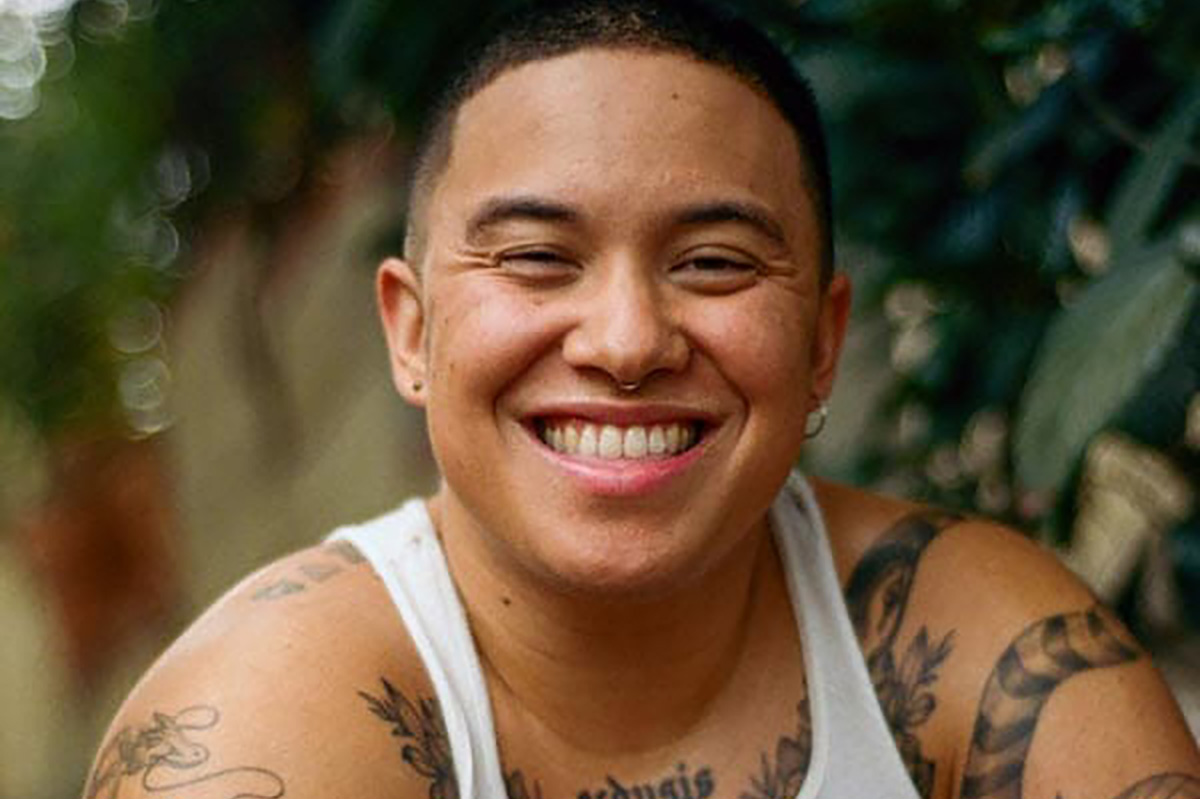
Job hunters by the thousands expressed disappointment, frustration, and anger Wednesday over the process to submit online applications for three lucrative but challenging positions as remote telephone operators for the nation’s only transgender-led crisis hotline, Trans Lifeline. One applicant complained on Instagram that their experience was akin to “The Hunger Games.”
But it turns out, the odds were never in their favor.
The CEO of the San Francisco-based nonprofit — kai alviar horton, who joined Trans Lifeline in July 2024 and does not capitalize any letters in his name — admitted on social media late Wednesday that their organization was not prepared for the sheer number of applications, which he said was anticipated to number 100, over 48 hours.
“We know now that our impact has caused so many of you hurt and further distrust in us,” horton wrote in the letter posted on Instagram, acknowledging that Trans Lifeline had endured “many storms of instability and harm.”
“The process we strived towards landed in ways that did not build accessibility,” they wrote. “This process hurt you, and we are genuinely sorry. We are committed to learning to do better.”
The job posting still appears online at a portal called levels.fyi offering an annual salary of $63,000, “generous paid time-off benefits” and “100% employer-paid health care premiums” as well as retirement benefits and more. Given that studies by the Williams Institute have shown the significant challenges trans people face in the workplace, from discrimination to harassment, especially in comparison to cisgender employees and candidates, Trans Lifeline’s offer was a beacon in the darkness to many.
“You know better than most how hard it is for trans people to get work, especially with decent pay,” wrote @terfhunter420. “I hope you’re reading the impact this application process has had on people here and consider making some big changes for your next batch of hiring. Something less like trying to score concert tickets on the radio.”
“To our surprise,” horton wrote, “we received over 2,500 applications before the submission window even opened,” which was at 1 p.m. EDT Wednesday. He said his team then “did our best to reach out to every single applicant to let them know to submit again within the window we outlined in the job posting.”
But when that window opened at 10 o’clock in San Francisco Wednesday, horton said his team was suddenly flooded with more than 1,200 submissions, “in just the first five minutes.”
The instructions to apply noted that in addition to a resume, candidates had to also submit a five-minute long, detailed self-made video, in lieu of a cover letter. The site indicates this was intended to “simplify the process.” But many frustrated candidates noted in their comments online that this particular requirement added a significant extra burden of time and energy, “only to have it all go to waste due to technical failures,” wrote @astoldbyjae.
Adding insult to injury is that untold thousands of potential candidates are left to wonder if their submissions were even received or would ever be seen, given that the portal was set up to be limited to accepting no more than 100 submissions on the first day; When hit with more than ten times that many applications, many job hunters reported getting error messages, and shared the pain of that experience in the comments on horton’s post.
“I’m heartsick myself right now,” wrote @zorro_nova. “I tried in that first minute only to get my own error message.” Another wrote: “I won’t lie I was definitely surprised to see how the hiring process was handled, it was almost like watching a Ticketmaster sale of a Taylor Swift concert more than a job listing.” @mistersister2024 added: “As someone who made the 5-minute video, carefully edited it, and then didn’t even get to submit it, this process was very frustrating.”
“We were devastated,” wrote @jennakjirsten. “I think it was hard not even being able to submit the form, even if it had been one of a thousand. We also worry that by only accepting the quickest to apply, you may have missed out on some very qualified applicants.”
As of press time, horton has not responded to an inquiry by the Blade about what if anything they will do for candidates who received error messages, or exactly how many applications they have on hand.
But in his online letter, horton did announce that so many submissions were received that to process them all, Trans Lifeline has postponed selection of candidates to be invited to interview for the three open positions until April 7, instead of March 24.
He also revealed the org has just two employees dedicated to reviewing all the applications received on Wednesday.
“Shout out to the two trans people in hiring who have to read 3,000 applications individually or else they get canceled,” wrote @jaki_riot. “Y’all some MVPs because the response to this situation feels a bit unreasonable.”
Several commenters praised horton for his apology and for their transparency.
“Imo, Trans lifeline has done SO much to earn that benefit of the doubt,” wrote @kingofyarn. “And seeing the backlash made me sad, because it’s as if y’all haven’t worked incredibly hard to earn that trust. I love this heartfelt apology and of course, transparency with a strong moral code.”
As horton acknowledged in his letter, Trans Lifeline has survived crises before now. Founded in 2014, the nonprofit’s two founders left the organization two years later amid accusations of corruption. An internal investigation found “there had been significant spending of Trans Lifeline funds outside the scope of the current budget” that “ran afoul of Trans Lifeline’s obligations to the 501(c)(3) tax laws.” A report in December 2023 by PBS indicated a downturn in donations forced the nonprofit to reduce the number of hours the hotline was available and slash its budget.
At that time, PBS reported the organization employed as many as 45 people, with around 200 volunteers who help, according to Adam Callahan, director for the hotline program. Every hotline operator identifies as either trans or nonbinary.
As of press time, the careers page on the Trans Lifeline site indicated “Staff Hotline Operator applications are closed.”
“We are so grateful for the overwhelming interest in our Hotline Operator positions—1,000 applications within the first two minutes! Thank you to each person who took the time to apply. We’ve received a fantastic pool of candidates and have now closed the application process. We are working diligently to review the first 100 complete applications received and aim to notify everyone of their status by Friday, March 21st. If you have not heard from us, be assured we are still actively considering your application. Please keep an eye on your inbox for our email. We will respond to everyone who has applied. We appreciate your understanding and enthusiasm.”
National
Trump hails anti-trans policies in partisan speech before joint session of Congress
GLAAD: ‘a baseless and unhinged disinformation campaign’

President Donald Trump delivered a divisive and partisan address before a joint session of Congress on Tuesday that also included multiple references to his administration’s anti-transgender executive actions.
“We’ve ended the tyranny of so-called diversity, equity, and inclusion policies all across the entire federal government and indeed the private sector and our military,” Trump said, promising, “our country will be woke no longer.”
Later, he said “We have removed the poison of critical race theory from our public schools, and they signed an order making it the official policy of the United States government that there are only two genders, male and female.”
“I also signed an executive order to ban men from playing in women’s sports,” Trump said.
At that point, the president introduced one of his special guests, Payton McNabb—who, he said, was seriously injured three years ago when her girls’ volleyball game was “invaded by a male” who spiked the ball “so hard in Peyton’s face, causing traumatic brain injury.”
GLAAD, in a press release before Trump’s speech, noted that “McNabb has since been hired by opponents of trans people to use her injury to argue that all trans youth should be denied the chance to play sports as their authentic selves.”
She is “a paid spokesperson for an anti-transgender group that also advocates to ban health care and to force schools to dangerously out LGBTQ youth without their consent,” the group wrote.
Trump continued, “Take a look at what happened in the women’s boxing, weight lifting, track and field, swimming, or cycling, where a male recently finished a long distance race five hours and 14 minutes ahead of a woman for a new record by five hours.”
“It’s demeaning for women, and it’s very bad for our country. We’re not going to put up with it any longer.”
During this section of the speech, news cameras turned to Riley Gaines, a former NCAA swimmer turned anti-trans activist, who was a guest of Republican U.S. Rep. Mariannette Miller-Meeks (Iowa) and has worked with the same group as McNabb.
GLAAD wrote that Gaines “parlayed her fifth place finish into a career of testifying in states she does not live in to support full bans on transgender youth as young as kindergarten from playing sports.”
Later, when decrying government spending, Trump noted $8 million was used “to promote LGBTQI+ in the African nation of Lesotho, which nobody has ever heard of” and $8 million “for making mice transgender.”
About an hour into his speech, the president said, “My administration is also working to protect our children from toxic ideologies in our schools. A few years ago, January Littlejohn and her husband discovered that their daughter’s school had secretly socially transitioned their 13 year old little girl.”
“Teachers and administrators conspired to deceive January and her husband while encouraging their daughter to use a new name and pronouns,” he said. “‘They-them’ pronoun, actually, all without telling January, who is here tonight and is now a courageous advocate against this form of child abuse.”
GLAAD notes that “records show January Littlejohn of Tallahassee, Fla., worked with the school district to support her nonbinary child, before Littlejohn sued the district with lawyers from a national anti-LGBTQ+ group.”
According to GLAAD, the family’s complaint accused school of discussing “restrooms and name change requests with their child without their consent” but “a public records request showed that the family had ongoing communications with the school and gave approval to let their child and their teachers lead on appropriate school protocols.”
“The Trump White House is using the address to Congress to continue its baseless and unhinged disinformation campaign against transgender Americans,” GLAAD said. “The invited guests being deployed to smear transgender people are paid spokespeople for anti-LGBTQ groups that demand schools dangerously out LGBTQ students without their consent, who go against every major medical association supporting medically-necessary health care, and do nothing to promote women and girls in sports or protect everyone’s safety and wellbeing.”
National
Landmark LGBTQ study disappears from Nat’l Park Service website
Inclusion of trans topics riled Trump political appointees

A landmark 2016 theme study that highlighted the history of the LGBTQ community was pulled from the National Park Service website on Thursday.
Last week, NPS received instructions to remove the “T” and “Q” from “LGBTQ” from all internal and external communications, triggering an uproar when trans people were removed from the website of the Stonewall National Monument.
At that time, an internal debate ensued over what to do with the LGBTQ Theme Study, with Trump political appointees calling for removal of all transgender references and some NPS staffers pushing back, suggesting instead that the entire study be removed. Editing the document to remove one community’s contributions violates the academic intent of the project, the source told the Blade.
In 2014, the Gill Foundation recognized an omission of historic LGBTQ sites in the nation’s records, and the organization made a grant to the National Park Service to commission a first-of-its-kind LGBTQ Theme Study, which was published in 2016. It was a landmark project that represented major progress for the LGBTQ community in having our contributions included in the broader American story.
The Blade took screen shots of the Theme Study site last week. This is how the study was described on the site: “LGBTQ America: A Theme Study of Lesbian, Gay, Bisexual, Transgender, and Queer History is a publication of the National Park Foundation for the National Park Service and funded by the Gill Foundation. Each chapter is written and peer-reviewed by experts in LGBTQ Studies. … During Pride Month in 2016, President Obama designated the Stonewall National Monument as the country’s first LGBTQ national monument. Today there are 10 LGBTQ sites designated as a National Historic Landmark or listed on the National Register of Historic Places.”
Removal of the theme study has raised concerns that future LGBTQ monuments and project work are dead in the water. The Blade reached out to the National Park Service last week for comment and received a curt response that the agency is implementing Trump’s executive order “Defending Women from Gender Ideology Extremism and Restoring Biological Truth to the Federal Government” as well as agency directives to end all DEI initiatives.
Marc Stein, director of OutHistory, a public history website that generates evidence-based LGBTQ research, issued a lengthy statement in response to the removal of the theme study.
“Our histories have been appropriated, censored, commodified, distorted, erased, falsified, marginalized, pathologized, rejected, silenced, and simplified,” Stein wrote. “… They think they can erase trans and queer people from history, remove trans women of color from the history of Stonewall, pretend that LGBTQ+ people did not exist, did not struggle, did not fight, did not suffer, did not survive, did not thrive. If they think any of this, they have never experienced or witnessed our perseverance, our rage, our resilience, our joy.”
National
The queer couple fighting for DEI — with math
‘My activism and my quantitative skills could be brought together’

When faced with questions of diversity, equity, and inclusion, detractors often respond with demands for evidence or complaints about cost.
Husbands Chad Topaz and Jude Higdon spend their time trying to find answers to those questions — on top of their other jobs as math professor, university administrator, and parents to a son and two dogs.
It started when Topaz, a mathematician, found himself as one of the only people in justice spaces able to quantify some of the issues facing marginalized communities. When community members pointed out that all the artists in the new wing of a local museum were white, Topaz then researched the diversity of artists at major museums. The study found that in 18 major U.S. museums, artists are 85% white and 87% male. On top of that research, Topaz determined more diversity existed in regions, time periods, and even museum permanent collections than was being displayed. “You’re taking a bad problem and making it worse through your curatorial decisions and practice,” says Topaz.
As it turned out, it also meant that Topaz was sometimes one of a few mathematicians with a concern for justice. When a colleague pointed out that there was only one woman on a 50-person mathematics editorial board—one of the highest professional achievements for an academic—Topaz set out to figure out if that was the exception or the trend. He looked at 435 journals, and it was indeed the trend.
These experiences were transformative. “My activism and sense of justice and my quantitative skills could be brought together,” said Topaz.
But finding projects was another story. Higdon, the administrator who Topaz praises as an “organizational genius,” was able to channel some of Topaz’s math-justice energy into collaborations with community partners. “I’m not afraid of tech nerds [and] mathematicians,” said Higdon, looking affectionately at his husband, “I know how to speak their language enough, but I also know how to build an organization and how to connect that work with other folks.”
So, following the success of early projects, the two co-founded the non-profit research institute QSIDE in 2017, which “uses data science to promote justice.” Citing Ida B. Wells’s famous quote, “the way to right wrongs is to turn the light of truth upon them,” Topaz says they believe that “data science can be a potent form of that light of truth.”
Since then, the team—which has grown beyond Higdon and Topaz—has published more than 15 peer-reviewed research articles, in addition to writing white papers and creating data tools.
One of their biggest projects bucks up against some of the biggest arguments against any work concerned with diversity, equity, and inclusion: that it’s too expensive. At least in one case, they have the numbers to prove otherwise.
QSIDE works with community partners who make programs to lower incarceration rates. People of color are more likely to be incarcerated. Community partners make programs for youth to “disrupt these cycles of incarceration and poverty,” says Higdon.
Regardless of how effective the programs are, state governments often opt not to fund them because of their cost. That cost analysis fails to acknowledge broader economic benefits from the programs—and losses from incarceration.
“We’ve built this econometric model that models out what’s the true cost of incarceration versus the cost of a program that can be used by community-based organizations,” says Higdon.
Topaz is also the author of a forthcoming book on the intersection of data and criminal justice, titled Counting on Justice. It explores the numbers behind inequality in the U.S. criminal justice system.
In the recent weeks, Higdon, Topaz, and QSIDE have been hit by the wave of anti-science and anti-DEI actions washing over the nation.
Higdon said that QSIDE lost a major corporate funder out of the blue, despite being assured they were set for renewal two days prior. “Is this because we have DEI in our name?” Higdon asked the grant manager, “and he kind of hemmed and hawed about it,” before saying no, but Higdon was not convinced.
Topaz, a career academic, has been watching the cuts to scientific agencies with horror. As a member of an advisory subcommittee at the National Science Foundation, Topaz had a mechanism to lodge an official complaint against the cuts, but the rest of the group balked, citing unspecific rules. When the group didn’t budge, Topaz publicly resigned.
“The director of the NSF is complying with illegal executive orders and not complying with stays that judges have put on those illegal actions,” Topaz said, “It seems to me like now is exactly the time we should be speaking out about these cuts.”
Topaz said the idea that any of these actions will promote better science or a meritocracy is a lie. “[It] is essentially segregation and keeping a vast pool of talent away from opportunities so that those opportunities can belong to white men. I won’t even use the word meritocracy to describe what they’re doing because that is a lie.”
With the widespread cuts to science funding, especially science concerned with DEI, the team is dedicated to doing the work. “We can weather this storm in a way that organizations that have a bigger infrastructure are not,” Higdon said. “We can stick to our principles despite the headwinds that we’re facing right now.”
At every point in the interview, Topaz and Higdon emphasized that while they are excited about the power of math and data, they don’t view their contributions as more important than others. Each project has partners from “boots on the ground, community members or community-based organizations that can represent the voices of affected people,” alongside any other subject-matter experts they may need.
“We don’t think our technical skills are better in any way,” said Higdon. “They have superpowers. We have superpowers. Together, we have a Justice League.”
(This story is part of the Digital Equity Local Voices Fellowship lab through News is Out. The lab initiative is made possible with support from Comcast NBCUniversal.)
National
Federal workers, trans service members cope with Trump attacks
‘We could very easily be entering a Lavender Scare 2.0’
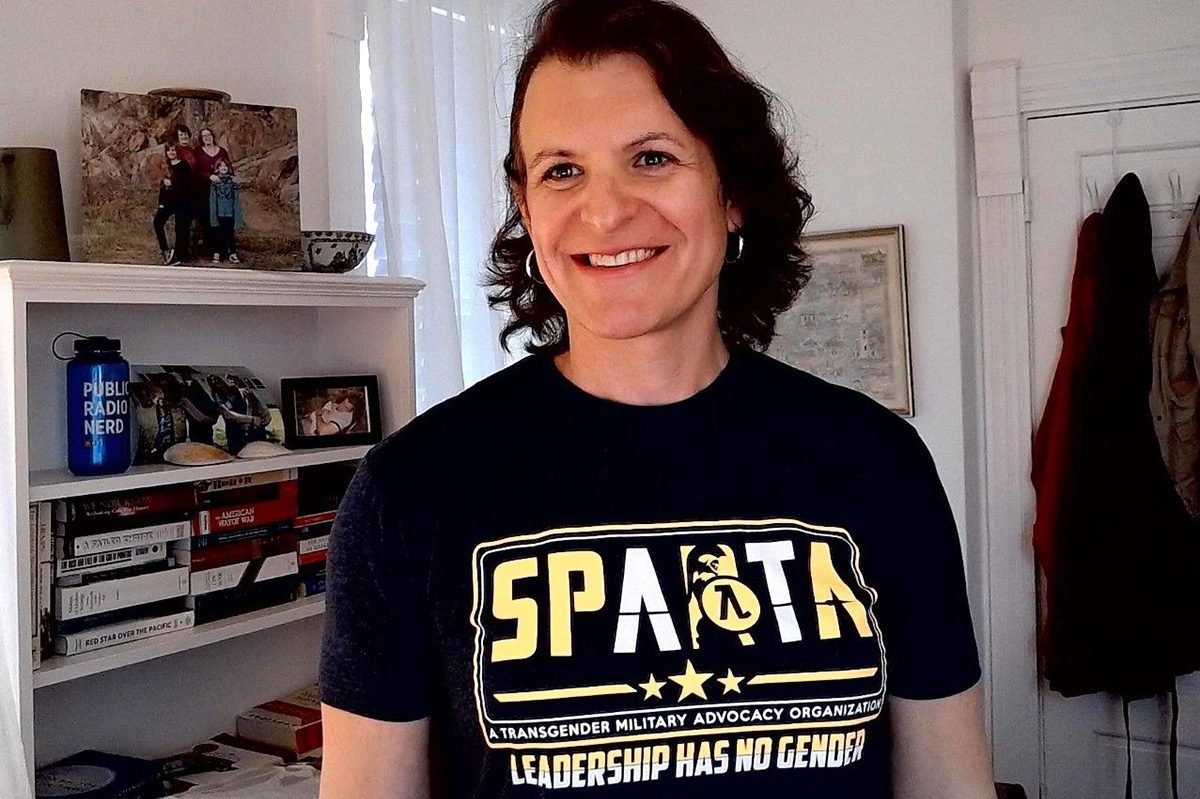
Since President Trump signed a series of executive orders rolling back federal worker protections, advocacy groups are ringing alarm bells signaling this could disproportionately impact more than 300,000 LGBTQ federal workers.
Trump has so far signed 65 executive orders, most of which attempt to shrink the size of the federal government and restructure how it works to better suit his interests. Of those 65 executive orders passed, at least six directly target LGBTQ people, one outright bans transgender people from serving in the military, and another ends all government efforts at promoting diversity, equity, and inclusion (DEI).
A study conducted in January by the Williams Institute, a research center that focuses on sexual orientation and gender identity law and public policy, showed that “one in ten LGBTQ adults are employed by the public sector,” with higher numbers of LGBTQ people working in federal government bureaus, the USPS, and as government contractors. This means that Trump’s orders could be particularly dangerous for LGBTQ Americans, potentially displacing hundreds of thousands of queer federal workers.
The Blade spoke with an LGBTQ executive branch employee who works directly with one of the resource groups targeted by the Trump administration to understand how these orders are being implemented internally. The source, fearing retaliation, requested anonymity.
“We had established lots of different things that were positive for LGBTQI+ employees to make sure that our identities were respected,” the source said. “What some folks may see as a simple thing like the allowance for pronouns in email signatures and the use of inclusive language, all those kinds of things are kind of in limbo right now. It’s fully expected to be said [by the Trump administration] that these things can’t be utilized anymore.”
The source noted that the public often misunderstands the role of these resource groups, making it harder to justify the need for such positions. A common misconception is that groups promoting DEI exist solely to hire minorities. Although part of their mission involves reaching historically underrepresented communities, their work extends far beyond recruitment, playing a crucial role in fostering inclusive workplace cultures and supporting employees.
“It’s just about creating that level playing field environment to make sure that you are doing the best for your organization to attract the best talent, and then the knowledge that it’s not just any one demographic that is best suited for a certain role,” they said. “Let me be very clear: It’s not about quotas, it’s not about checking boxes. It’s not about hiring one person on anything other than qualification over another. It’s about making sure that we’re looking at places where we may be missing opportunities for not just qualified candidates, but the best and brightest. And sometimes that means adjusting your recruitment style.”
This ongoing attack on DEI, as well as other efforts to promote inclusivity and fairness within the government by the twice-impeached president is a borrowed tactic from another infamous Republican who weaponized demagoguery to consolidate power — Sen. Joseph McCarthy.
“We could very easily be entering a Lavender Scare 2.0,” the source continued. “I mean, when you’re asking employees to rat on each other, basically, for anybody who might be involved in anything surrounding this work, it’s not unknown that a majority of folks who do diversity, equity, and inclusion work are members of minority, marginalized communities. It just painted a big target on the back of all those people.”
When asked to speculate on what they think this could mean for the roughly three million federal workers, the source said it could lead to a chilling effect where LGBTQ employees either face direct removal or feel compelled to leave due to a hostile work environment.
“I see an exodus coming — whether it is forced or voluntary,” said the source. “I don’t see with all the progress that’s been made over the last two decades people willing to stay working for an organization where they don’t feel like they’re safe. If you feel like you don’t have the psychological safety to do your job, and you’re worried about whether you’re gonna get fired, it kind of kills your psychological availability to do your job. People are not engaged.”
Colonel Bree Fram, the highest-ranking out transgender officer in the Department of Defense, who spoke to the Blade in her personal capacity and does not speak on behalf of the U.S. government or military, agreed with the source’s thoughts on inclusive spaces being critical for the success of government work and safety.
“Any policy that excludes a class of individuals is inherently damaging to national security, because if those individuals can meet the standards of the service, if they can accomplish the mission that they’ve been given, they are participating in a way that makes us stronger,” Fram said. “We create better solutions from a diverse set of perspectives that allows us to accomplish the mission in ways that support national security objectives. So if there is a transgender service member out there excluded merely for who they are, rather than their ability to complete their mission it’s an issue for our national security today and far into the future, because we have thousands of transgender service members actively accomplishing the mission today. They are doing so in a way that meets, or, in most cases, exceeds the standards, because they are highly capable, competent warriors that have learned their skill set and mastered their craft over decades, they are crushing it on behalf of the United States and in upholding their oath to the Constitution.”
The executive branch source echoed that sentiment. Both sources agree that the removal of these policies has the real potential to harm the government’s ability to function as a resource for its people.
“It takes a special type of person to work for the government,” the source said. “You’re not going to get rich. You’re not going to make as much money, generally. In the private sector you would, especially for folks who work in some of these specialized areas. Why would you want to work somewhere that you’re going to go nowhere, and no matter how hard you work, you’re not going to get anything?”
Not only do government employees feel they can’t perform at a professional level with these executive orders, some have expressed that they fear for the personal lives of LGBTQ staff members now too.
“People are concerned,” Fram said. “People are worried about what will happen to people that they work with. When any leader sees someone in their organization having a difficult time or having something outside of what they need to focus on to accomplish their duties, it is our responsibility as a leader to help that person through those issues. That is what leaders within the military, I believe, are seeing right now. They see members of their military family hurting and concerned about what their future may be. As a leader, we want to take care of people so that they can take care of the mission and having to spend resources to take care of people when they are hurt is very important, but it is also time consuming, and takes us away from things that we do need to be focused on.”
To find “things that we need to focus on,” is easier said than done. Fram said that for LGBTQ members of the federal workforce, specifically trans members of the military, it’s not only the fight against unjust actions and rhetoric from Trump, but also internally within the service members themselves.
“The challenge all of us face is, how do we determine and know our own self worth?” Fram asked. “Do we let an outside source define who we are? For transgender people, that is a deep strength of ours. … We know what to focus on. We know that we are who we are. We exist, and it is our deep duty and responsibility to care about future generations and protecting and defending our freedoms.”
When asked how to support people in these groups as workplace inclusion shifts away from being a standard part of their professional environment, Fram had a simple answer: listen to those who are being excluded.
“I believe the most powerful thing any of us have is our story,” Fram said. “Our story of courage and commitment and development and capability, how we serve, how we accomplish the missions that we’ve been given. So the best thing people can possibly do right now is share our stories, connect with our humanity, understand who we are in reality, not the rhetoric being used to demonize us. Trans people are a small portion of the population, so it’s easy to hate who you don’t know or don’t understand or have never met. So meet a trans person, read their story, share their story, and your perceptions may change.”
The Blade reached out to the Trump-Vance administration for comment but did not receive a response.
In the long run, Fram explained, vilifying and marginalizing people for who they are ultimately harms the cohesive team dynamics essential to achieving a common goal — whether on the battlefield or in the boardroom.
“What we’ve learned from countless examples through history, for trans people, for lesbians, gays, and bisexuals, and for other groups, anyone really who had to hide a piece of their identity in order to serve,” Fram said. “You cannot be as effective as you can be when you are spending energy hiding who you are. That’s a concern I have as more people pull back and have to hide a portion of who they are. We lose some of that cohesion within teams, because that energy that you have to spend on protecting yourself could be dedicated to building the cohesive relationships around you that foster teams that become incredibly successful. That’s one of the things where people being authentic serves the purposes of the military. It builds those strong bonds that allow teams to function effectively and accomplish their wartime mission.”
National
Trump’s trans erasure arrives at National Park Service
Fate of major 2016 LGBTQ Theme Study unclear

President Trump’s efforts at erasing trans identity intensified this week as employees at the National Park Service were instructed to remove the “T” and “Q” from “LGBTQ” from all internal and external communications.
The change was first noticed on the website of the Stonewall National Monument; trans people of color were integral to the events at Stonewall, which is widely viewed as the kickoff of the modern LGBTQ rights movement. The Stonewall National Monument is the first U.S. national monument dedicated to LGBTQ rights and history.
Reaction to that move was swift. New York City Council member Erik Bottcher wrote, “The Trump administration has erased transgender people from the Stonewall National Monument website. We will not allow them to erase the very existence of our siblings. We are one community!!”
But what most didn’t realize is that the removal of the “T” and “Q” (for transgender and queer) extends to all National Park Service and Interior Department communications, raising concerns that the move could jeopardize future LGBTQ monuments and project work.
The Blade reached out to the National Park Service for comment on the trans erasure and received a curt response that the agency is implementing Trump’s executive order “Defending Women from Gender Ideology Extremism and Restoring Biological Truth to the Federal Government” as well as agency directives to end all DEI initiatives.
The question being debated internally now, according to a knowledgable source, is what to do with a massive LGBTQ Theme Study, which as of Feb. 14 was still available on the NPS website. In 2014, the Gill Foundation recognized an omission of historic LGBTQ sites in the nation’s records, and the organization made a grant to the National Park Service to commission a first-of-its-kind LGBTQ Theme Study, which was published in 2016. It was a landmark project that represented major progress for the LGBTQ community in having our contributions included in the broader American story, something that is becoming increasingly difficult given efforts like “Don’t Say Gay” laws that ban the teaching of LGBTQ topics in schools.
A source told the Blade that National Park Service communications staff suggested that removing chapters of the 2016 Theme Study that pertain to transgender people might placate anti-trans political appointees. But one employee pushed back on that, suggesting instead that the entire Theme Study be removed. Editing the document to remove one community’s contributions and perspective violates the academic intent of the project, according to the source. A final decision on how to proceed is expected soon.
Meanwhile, a protest is planned for Friday, Feb. 14 at noon at Christopher Park in New York City (7th Ave. S. and Christopher Street). The protest is being planned by staff at the Stonewall Inn.
“The Stonewall Inn and The Stonewall Inn Gives Back Initiative are outraged and appalled by the recent removal of the word ‘transgender’ from the Stonewall National Monument page on the National Park Service website,” the groups said in a statement. “Let us be clear: Stonewall is transgender history. Marsha P. Johnson, Sylvia Rivera, and countless other trans and gender-nonconforming individuals fought bravely, and often at great personal risk, to push back against oppressive systems. Their courage, sacrifice, and leadership were central to the resistance we now celebrate as the foundation of the modern LGBTQ+ rights movement.”
National
Historic Oscar showing for ‘Emilia Pérez’ stirs controversy
Karla Sofía Gascón is first trans nominee for Best Actress

When the Academy of Motion Picture Arts and Sciences makes the annual announcement of Oscar nominations, it’s always a day of divisive opinions – but even the most divisive Oscar controversies of the past are bound to end up feeling like a pleasant chat over brunch compared with the one that has predictably erupted over yesterday’s revelation of the Academy’s slate of contenders, in which “Emilia Pérez” became not only the most-nominated film of the year, but the first to score a Best Actress nod for a transgender actor.
It’s a milestone that hardly comes as a surprise. The film’s star, Karla Sofía Gascón, has been considered a front-runner in the category throughout the awards season so far, already winning the Golden Globe for Best Lead Actress (Musical of Comedy) and snagging an equivalent nomination for the upcoming SAG Awards – whose membership also happens to represent the largest percentage of Academy voters, thereby making their choices a solid indicator of how things are going to go down on Oscar night. In any other year, apart from being noted as a historic first and inevitably ruffling a few conservative feathers, Gascón’s inclusion in the lineup would likely otherwise feel like business as usual.
That, however, was before the return of convicted felon Donald Trump to the White House. Days after the former reality show star signed an executive order proclaiming that the United States will henceforth legally recognize only “two genders” (justified in part by the invocation of “concrete reality,” whatever that is), it seems that Academy voters have a dissenting opinion – and suddenly, a simple Oscar nomination feels like an act of resistance against the government itself.
For those who have yet to see the film (which is now streaming on Netflix), “Emilia Pérez” is a sprawling musical drama in which Gascón portrays a powerful Mexican cartel boss who enlists an idealistic lawyer (Zoe Saldaña, also nominated for an Oscar, as Best Supporting Actress) to facilitate a gender transition, so that she can disappear from her brutal life of violent conflict and finally live freely as the true self she has always had to keep hidden. It’s an epic-length saga, blending multiple genres into a larger-than-life, unpredictable wild ride that both celebrates traditional cinematic conventions and shatters them.
In addition to the kudos for Gascón and Saldaña, the film – which, though its dialogue is mostly in Spanish, was produced in France, giving it the additional distinction of earning the highest number of nominations of any non-English-language movie in Oscar history – also earned its place among the 10 Best Picture contenders, where it competes against more traditionally styled favorites like “Conclave,” “Wicked,” and the Chalamet-as-Dylan biopic “A Complete Unknown,” as well as “artsier” titles like “Anora” and “The Brutalist.” Additionally, filmmaker Jacques Audiard is nominated as director and co-screenwriter (with Thomas Bidegain, Léa Mysius, and Nicolas Livecchi, in the Adapted Screenplay category), with two nods in the Best Song category and a host of so-called “technical” awards to round out its whopping total of 13 – only one nomination fewer than the three films (All About Eve,” “Titanic,” and “La La Land”) currently tied at 14.
Other films on the Oscar roster also gathered a high tally; “The Brutalist,” Brady Corbett’s critically lauded examination of the “American Dream” through the experiences of a Holocaust survivor (Adrien Brody) on his way to becoming a celebrated architect in the mid-20th-century United States, got 10, as did John M. Chu’s blockbuster adaptation of “Wicked” (including one each for stars Cynthia Erivo and Ariana Grande). Among other multiple nominees are “Conclave,” “Anora,” and “A Complete Unknown,” along with “The Substance,” which earned a Best Actress nod for previous dark horse candidate Demi Moore as one of its total.
Other nominations of note: Colman Domingo, whose well-deserved Best Actor nomination for “Sing Sing” gives him another shot at becoming the first openly gay person to win in that category; a pair of nominations for literary adaptation “Nickel Boys,” a story of two Black American youths at an abusive reform school in 1960s Florida; a nomination for Isabella Rossellini, daughter of three-time-Oscar winner Ingrid Bergman and Italian cinema maestro Roberto Rossellini, as Best Supporting Actress for her role in “Conclave”; and the inclusion of “Memoir of a Snail,” a uniquely poignant Australian film which features (among other non-kid-friendly things) a pair of queer characters being subjected to conversion therapy, among the nominees for Best Animated Feature.
As always, there were snubs, too: egregiously, Daniel Craig, the star of Luca Guadagnino’s “Queer” who was widely seen as a front runner, was shut out for a Best Actor nomination. Guadgnino, who also directed the bisexual tennis romance “Challengers” this year, saw both of his movies come up empty-handed; also left out was a Best Actress nod for Pamela Anderson’s breathtaking comeback turn in “The Last Showgirl,” despite promising buzz and a strong showing at previous awards ceremonies this season.
Nevertheless, while in other years these subjectively labeled hits and misses might be fodder for plenty of debate in the public forum, none of them are even a storm in a teacup compared with the uproar around “Emilia Pérez” – which thus far (at this writing, anyway) has focused on detracting from the merits of the film itself, rather than at its transgender star. We get it: “Emilia Pérez” is not a film for all tastes, so it’s not surprising that many film fans are appalled at the acclaim it has received.
Even so, thanks to the atmosphere of transphobic oppression that has been forced upon us by Trump and his extremist cronies, any discussion of the film and its nominations must now be considered with all one’s critical thinking skills, because any arguments, either for or against its worthiness, might merely be a smokescreen for a deeper agenda than defending a set of cinematic aesthetics.
For our part, of course, we celebrate the film for its bold inclusivity, as well as its fantastical exploration of not only gender, but justice, corruption, politics, and all the contradictory passions that make being human what it is. We also celebrate Gascón’s nomination and the significant historic impact it carries – particularly coming at this precarious moment in the American story.
As for Oscar night, we have no idea what to expect, so our only prediction about the ceremony on March 2 also serves as a bit of advice, courtesy a quote from a previous Oscar champion: “Fasten your seat belts, it’s going to be a bumpy night.”
-

 History4 days ago
History4 days agoLos Angeles Blade celebrates 8 years!
-

 Arts & Entertainment4 days ago
Arts & Entertainment4 days agoBillboard’s Women in Music ticket giveaway announcement
-

 Advice5 days ago
Advice5 days agoI want to leave my perfect boyfriend
-

 News3 days ago
News3 days agoHere are 3 events to celebrate Trans Day of Visibility
-

 Autos4 days ago
Autos4 days agoGreen machines on the scene
-

 Arts & Entertainment3 days ago
Arts & Entertainment3 days agoWin your tickets to Margaret Cho at The Grammy Museum for one rare night!
-

 India3 days ago
India3 days agoLGBTQ+ poets included in India’s premier literary festival
-

 Television1 day ago
Television1 day agoNo, ‘Mid-Century Modern’ is not a ‘Golden Girls’ remake
-

 Obituary3 hours ago
Obituary3 hours agoNanette Kazaoka, an unlikely AIDS activist, dies at 83

